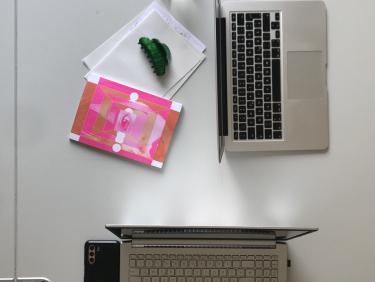Studies Mobility Semester: Internship Option
The preparations for the mobility semester can start as early as the first semester. Below, you will find a compilation of basic information regarding the internship option (Modules Mobility and Research 1 & 2). If you have questions or need more specific input, please consult your study focus advisor.

Why should I do an internship?
Study-related motivation
- Grounding: Connect theoretical problems to practice and allow work practice to shape theoretical problems.
- Inspirational: Your internship can ideally serve as preliminary research for your MA thesis.
Long-term perspective
- Work experience: Gain practical experience in a specific field and acquire work skills. In many companies and institutions, internships radically enhance your job chances. Suppose you want to pursue a career as a curator in an art institution in Germany. In that case, you first need to conduct an internship (or even internships) in art institutions while you study. After you graduate, you can apply for a two-year traineeship (Volontariat). The ‘Volontariat’ then enables you to apply for proper positions.
- Building networks: Often, internships bring you in contact with like-minded colleagues. These networks are invaluable when you enter the job market, and even when you decide to pursue a PhD.
Where can I find an internship?
Anywhere! In Heidelberg and the Rhein-Neckar region, in Germany, in the city where you study abroad, in a country where you want to enhance your language skills… Ensure that the institution/company you apply to fits your study focus and allows you to pursue your research interests (below).
For internships in Heidelberg, see:
Students share their experiences
Below, you will find some former and current MATS students' reports on their experiences completing an internship during their mobility semester.
Internship at CEPAL/ECLAC, Ciudad de México, México
Sophia completed a 6 months internship during her 3rd semester at the Economic Comission for Latin America and the Caribbean, a branch of the United Nations. She received a DAAD (German Academic Exchange Service) grant for short term internships abroad. She worked as a research assistant in the Social Development Unit and her foci were research projects about structurally weak regions in México and Honduras as well as the labour rights of housekeepers in México. She also wrote a research paper about the organisation as a site of knowledge production. If you want to know more you can reach out to Sophia via email:

How long and how intense should the internship be?
It is up to you and the hosting institution/company to agree upon the duration and intensity. Different models are possible, for example, full-time, three months (or two, or one), half-time, or even just one day a week for six months. Regarding credits: 3 months full-time (and the report, see below) would translate into 28 credits, meaning you would have fulfilled the modules M&R 1+2. For a more fine-grained translation of working hours into CPs, please contact MATS-coordinator.
Will I be paid?
The payment depends on the hosting institution and is regulated differently in different countries. In Germany, internships that last longer than three months full-time must be paid (legally binding), but some other institutions also pay for shorter internships. If you get paid, your internship still counts towards your credits.
How does the internship fit into my study plan?
You can get credits for internships in the modules Mobility and Research 1 & 2. You do not have to do an internship (you can also study abroad or keep studying in Heidelberg). Still, the internship option is a great experience to gain work experience and find out what you might want to do (or what you don’t want to do) after graduation. If you are considering to do an internship, please talk to your study focus advisor who has to approve that the internship would fit your study goals.
How do I organize the internship?
You need to organize the internship yourself but can approach your study focus advisor to consult and receive support. In fact, your study focus advisor has to approve of your internship (same as with the Skills module and the Study Abroad Learning Agreement).
[Application:] When you apply, you can either answer a call or send an unsolicited application. In particular, smaller institutions and companies might not formally announce their internship positions but might be willing to accept interns. Some German institutions only allow “Pflichtpraktika”, meaning internships that students have to do mandatorily. In our MATS-program, internships are a so-called “Wahlplichtmodul”, meaning you have the choice. In our experience, many institutions who are calling for “Pflichtpraktika” also accept “Wahlpflichtpraktika”. The MATS-coordinator can provide you with a form that states that your internship is a “Wahpflichtpraktikum”.
[Supervision:] Once you have found a host, you need to develop a research interest that you pursue while doing the internship. Your research must be supervised by an HCTS academic staff member. Ideally, your prospective MA-thesis supervisor is also the supervisor of your internship.
[Registration:] Once you have found an internship position, you and your supervisor (from the HCTS, not from the institution/company hosting your internship) must sign and internship agreement. The internship agreement states the topic of your research as well as the working hours. You get the agreement from the MATS-coordinator or your study focus advisor and must submit it before you the beginning of the internship.
[Report:] After the internship, you need to write an academic paper in which you engage with the topic you researched during your internship. The report is (ideally) a pre-study of your MA thesis.
Internship Q&A
Keep an eye out for emails from the MATS programm coordinator and MATS teaching staff, if there will be another Q&A session on internships you will be informed through institute channels as soon as possible.